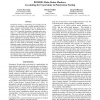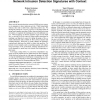27 search results - page 2 / 6 » Regular Protocols and Attacks with Regular Knowledge |
AAAI
2012
11 years 7 months ago
2012
Penetration Testing is a methodology for assessing network security, by generating and executing possible hacking attacks. Doing so automatically allows for regular and systematic...
IJIPT
2010
13 years 3 months ago
2010
: The Address Resolution Protocol (ARP) has proven to work well under regular circumstances, but it was not designed to cope with malicious hosts. By performing ARP spoofing attack...
DSN
2006
IEEE
13 years 11 months ago
2006
IEEE
Being a fast-growing Internet application, Voice over Internet Protocol (VoIP) shares the network resources with the regular Internet traffic, and is susceptible to the existing ...
DSN
2009
IEEE
13 years 8 months ago
2009
IEEE
The Border Gateway Protocol (BGP) is a fundamental building block of the Internet infrastructure. However, due to the implicit trust assumption among networks, Internet routing re...
CCS
2003
ACM
13 years 10 months ago
2003
ACM
Many network intrusion detection systems (NIDS) use byte sequences as signatures to detect malicious activity. While being highly efficient, they tend to suffer from a high false...


